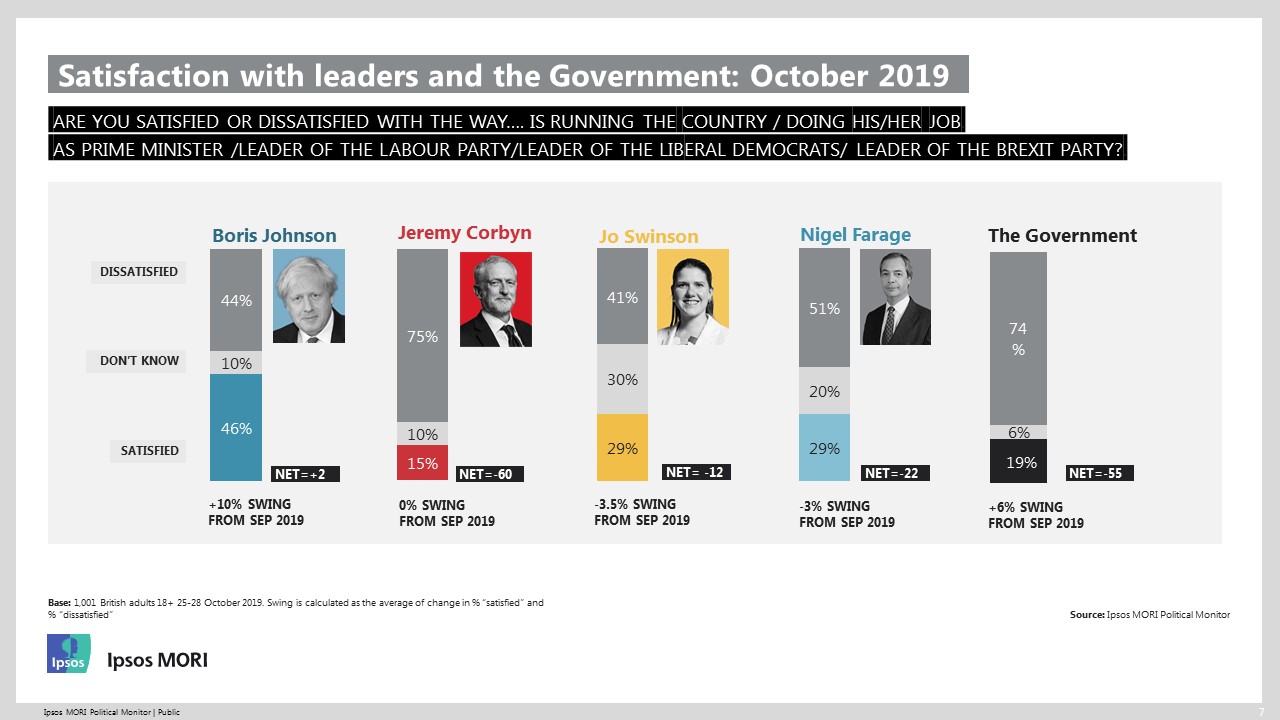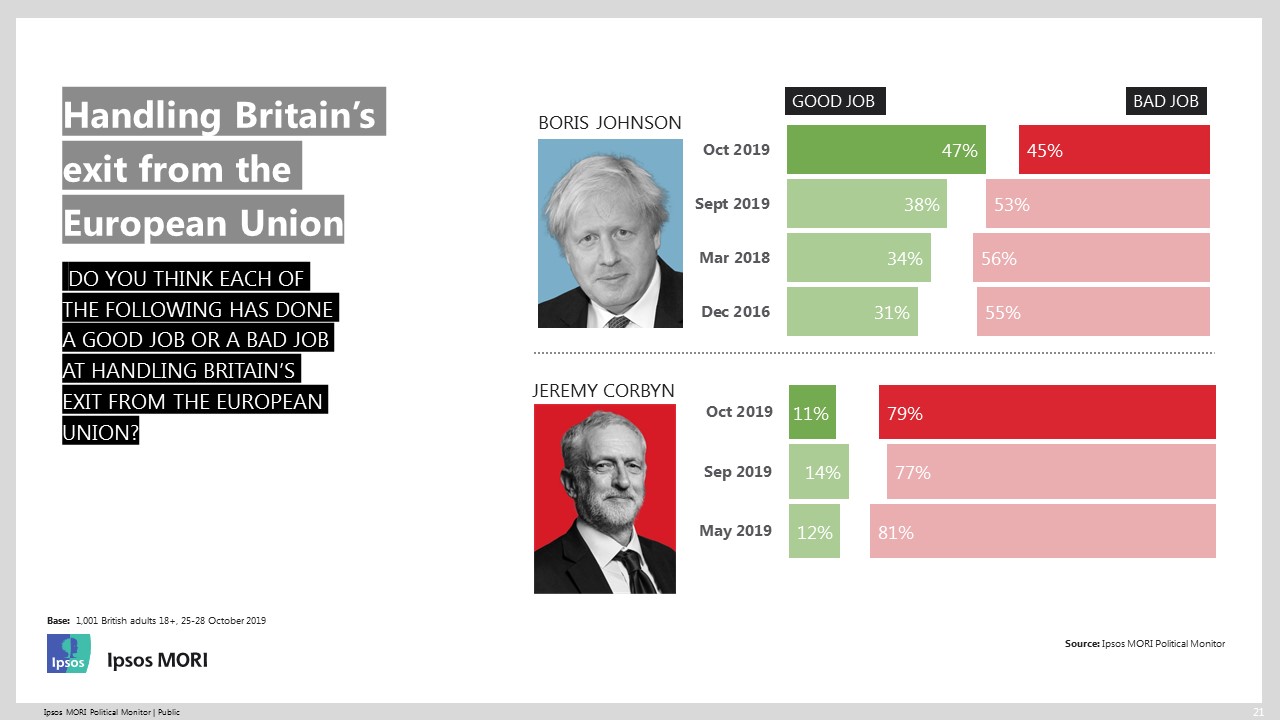Conservatives strengthen position in latest Ipsos Political Monitor
In the latest Ipsos poll, with fieldwork conducted before the election was called, the Conservatives have taken a 17-point lead over Labour, significantly improving on their position in September.
- Conservatives increase lead over Labour to 17 points
- Public satisfaction with Johnson’s performance as PM improves, Corbyn ratings still at historic lows
- Public divided over merits of Johnson’s Brexit deal – but more positive than they were for Theresa May’s
- Yet warning signs for Conservatives as 3 in 4 dissatisfied with government and majority expect economy to worsen in the next 12 months
In the latest Ipsos poll, with fieldwork conducted before the election was called, the Conservatives have taken a 17-point lead over Labour, significantly improving on their position in September.
Conservatives 41% (+8)
Labour 24% (nc)
Lib Dems 20% (-3)
Brexit Party 7% (-3)
Greens 3% (-1)
Other 5% (nc)
Leader satisfaction ratings
- Boris Johnson has improved his satisfaction ratings with the public. 46% of British adults are now satisfied with the job he is doing as Prime Minister and 44% dissatisfied. This compares with 37% satisfied and 55% dissatisfied in September. Johnson’s net satisfaction ratings now stands at +2 – the best score for any party leader since 2017.
- In contrast, just 15% are satisfied with the job Jeremy Corbyn is doing as leader of the Labour Party and 75% are dissatisfied. His net rating of minus 60 equals the worst rating of any Leader of the Opposition in the Ipsos Political Monitor series, a record that Corbyn himself set in September this year where 16% were satisfied and 76% dissatisfied with the Labour leader.
- 80% of Conservative voters are satisfied with the job Johnson is doing as PM. 9% are dissatisfied and 11% don’t know. In contrast, 46% of Labour voters are satisfied with Corbyn and 49% are dissatisfied. 5% don’t know.
- 29% are satisfied with the job Jo Swinson is doing as Lib Dem leader, 41% dissatisfied and 30% don’t know. This gives Swinson a net satisfaction rating of minus 12. This has fallen from minus 5 in September.
- 29% are satisfied with the job Nigel Farage is doing as leader of the Brexit Party, 51% dissatisfied and 20% don’t know. His net rating of minus 22 is also down on September (-16).

Johnson’s deal and handling of Brexit
- The public is divided on the merits of Johnson’s Brexit deal. 38% think it would be a good thing if the UK withdrew on these terms, 44% say it would be a bad thing, 4% say neither and 13% don’t know. However, these scores are much better than Theresa May achieved for her deal in December 2018, where 25% thought withdrawing on those terms would be a good thing and 62% said bad thing.
- Overall 51% of British adults say that they know ‘a great deal’ or ‘a fair amount’ about Johnson’s deal compared with 49% that say they know ‘not very much’ or ‘nothing at all’.
- Public perceptions of Johnson’s handling of Brexit have improved this month. 47% think he has done a good job handling Brexit (up from 38% in September) and 45% think he has done a bad job (down from 53%). 84% of Conservative voters think Johnson has done a good job handling Brexit.
- In contrast, just 11% think Corbyn has done a good job handling Brexit with 79% saying he has done a bad job. Just 37% of Labour voters think Corbyn has done a good job compared with 52% that say he has done a bad job.
- There are few signs of a further Brexit delay hurting perceptions of Johnson. 30% think it is a good thing that Britain did not leave on October 31st and 39% say bad thing. 28% say it makes no difference and 3% say they don’t know.
- MPs in Parliament are held most responsible for Britain not leaving the EU this month (50%), compared to 30% and 21% saying Jeremy Corbyn and Boris Johnson respectively.
- Conservative supporters and those disappointed that the UK is not leaving the EU this month are less likely to blame Boris Johnson for the failure to leave than MPs in Parliament generally. 4% of Conservatives blame Johnson compared with 54% that blame MPs in Parliament whilst 9% of those that think the UK not leaving this month is a bad thing blame Johnson compared with 56% that blame MPs.

Government ratings and economic pessimism
Despite positive poll ratings for the Conservatives and Johnson this month there are some warning signs for the government as the election campaign begins.
- 74% are dissatisfied with the way the Government is running the country. Just one in five (19%) are satisfied and 6% don’t know. This makes a net satisfaction rating of minus 55 (which has improved from minus 67 in September but is still very low for a new government).
- The public are pessimistic about the future of the economy. 56% think it will get worse in the next 12 months, 19% say it will stay the same and 17% say it will improve. The net Economic Optimism Index score this month is therefore minus 39, compared to minus 44 in September.
Johnson and Britain’s standing in the world
- 33% think Boris Johnson has improved Britain’s standing in the world since assuming office compared to 35% that think he has made it worse and 32% that say he has made no difference.
Gideon Skinner, Head of Politics at Ipsos, said:
As Theresa May knows, a poll lead before a campaign has got started is no guarantee of success. This poll also puts the Conservatives at the upper margins compared with other polls. Nevertheless, it confirms the Conservatives are starting in a strong position: on a central issue of the campaign their Brexit strategy is galvanising their support, with little sign they are receiving much blame for the delay, while they also have the most popular leader, a key factor in previous elections. However, the low ratings for the government overall suggests they could be vulnerable if the campaign moves onto other areas, and things can still change
Technical Note
Ipsos interviewed a representative sample of 1,001 adults aged 18+ across Great Britain. Interviews were conducted by telephone 25th – 28th October 2019. Data are weighted to the profile of the population. All polls are subject to a wide range of potential sources of error. On the basis of the historical record of the polls at recent general elections, there is a 9 in 10 chance that the true value of a party’s support lies within 4 points of the estimates provided by this poll, and a 2 in 3 chance that they lie within 2 points.






